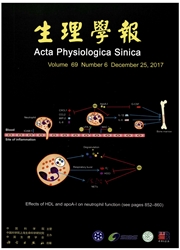

 中文摘要:
中文摘要:
β-arrestin2是G蛋白偶联受体的负反馈调控蛋白,介导受体的脱敏,此外β—arrestin2还可以通过招募信号分子,介导G蛋白非依赖的信号传导过程。β-arrestin2广泛分布于各重要脑区,参与神经环路的信号传递。本文旨在研究β-arrestin2在可卡因诱导的小鼠奖赏行为中的作用。采用β—arrestin2基因敲除小鼠口rrb2+),检测了β-arrestin2在不同剂量可卡因诱导的条件性位置偏爱(conditioned place preference,CPP)形成中的作用,还检测了其在可卡因诱导的自主活动性变化中的作用。结果显示,在中等剂量(20mg/kg)和高剂量(30mg/kg)可卡因诱导的CPP实验中,Arrb2+小鼠比野生型小鼠(Arrb2+)表现出更强的可卡因诱导的位置偏爱,而在低剂量(10mg/kg)可卡因实验中两者无显著性差异。可卡因诱导的Arrb2-/-小鼠的自主活动性显著低于4rrb2+小鼠。以上结果提示,β-arresstin2在可卡因诱导的奖赏行为中起重要作用。
 英文摘要:
英文摘要:
Besides its role in desensitization and internalization of receptors, β-arrestin2 facilitates G protein-independent signaling through its ability to scaffold various signaling molecules. β-arrestin2 is widely distributed in the central nervous system, and mediates signal transduction of brain circuit. The aim of the present study was to investigate the role of β-arrestin2 in reward behaviors induced by cocaine. We assessed the conditioned place preference (CPP) induced by low (10 mg/kg), moderate (20 mg/kg) and high (30 rag/ kg) doses of cocaine in Arrb2-/- mice and Arrb2+/+ controls. In the Arrb2/- mice, moderate and high, but not low, dose of cocaine induced pronounced increases of CPP scores, which were higher than those in the Arrb2+/+ mice. Moreover, cocaine-induced locomotor activity was significantly lower in Arrb2-/- mice than that of Arrb2+/+ littermate controls. Taken together, our results suggest a potential role of β-arrestin2 in the cocaine-induced rewarding behaviors.
 同期刊论文项目
同期刊论文项目
 同项目期刊论文
同项目期刊论文
 期刊信息
期刊信息
